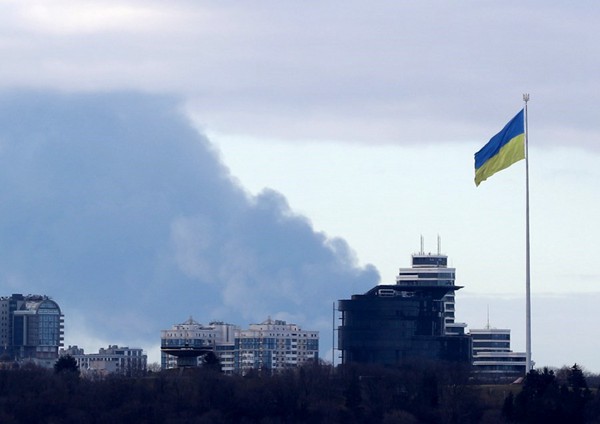Who will gain most politically from the crisis?
- By Robert Griffiths
 0 Comment(s)
0 Comment(s) Print
Print E-mail China.org.cn, April 12, 2022
E-mail China.org.cn, April 12, 2022

In Britain, who will gain the most politically from the Ukraine crisis?
Public sympathy for the plight of the Ukrainian people is widespread.
People also want to see Boris Johnson's government remove the barriers that prevent many more Ukrainian refugees from entering Britain. Many thousands of families have declared their readiness to provide accommodation to them.
However, perhaps surprisingly, the public mood in Britain has so far had little impact on people's views of the main political parties.
The Labour Party's lead in the opinion polls has narrowed slightly since tensions on the Russia-Ukraine border hit the headlines in late January. Labour had overtaken the Conservatives toward the end of last year amid growing criticism of government double standards and corruption in relation to Covid rules and commercial contracts.
The biggest change has been in Boris Johnson's personal approval ratings. The daily death toll from the pandemic began falling as the Ukraine crisis grew, lending credibility to claims that his Covid policies were working, while the Ukraine crisis drew attention away from government incompetence.
Yet a majority of people in Britain continue to disapprove of Johnson's record as Prime Minister. His response has been to present himself as one of the leaders of a united Western struggle against Russia.
Any idea that the West, NATO, or politicians might have contributed to creating the conditions for military conflict in Ukraine has been banished from almost all television, radio, and newspaper platforms.
The Russia Television (RT) channel has been bundled off the air in Britain, although its coverage of the war was less unbalanced than that of the BBC and Sky.
Anti-Russia Cold War passions and prejudices are being stoked by the media and politicians, leaving many people in Britain under the illusion that Russia's aim is to control much of Eastern Europe, if not the whole continent.
Anyone who criticizes or even questions the relentless eastern expansion of NATO, or who suggests that some of Russia's security concerns may be legitimate, is likely to be labeled a Kremlin apologist.
Communists and other campaigners calling for a ceasefire and peace negotiations have been abused and physically attacked as Moscow stooges.
Even before the Ukraine crisis began, leader of the Labour Party Keir Starmer attacked the Stop the War coalition for "showing solidarity with the aggressor." He threatened to eject 11 MPs from the Parliamentary Labour Party unless they withdrew their signatures from Stop the War's statement on the outbreak of the Ukrainian crisis on Feb. 24.
In truth, Stop the War's real offence was to condemn the expansion of NATO and U.S. and British "wars of aggression" over the past three decades. Starmer's view is that the foundation of NATO was the greatest achievement on the world stage of the 1945-51 Labour government. He is the first Labour leader since then to rule that criticism of NATO is, in effect, incompatible with being a Labour MP.
It's possible that wrapping himself in the NATO flag will maintain Starmer and Labour's lead in the opinion polls. But he will need much more than this to overturn the Conservative Party's overall majority of 77 seats at Westminster in Britain's next General Election, scheduled for 2024.
As gas, electricity, petrol, public transport, and food costs far outstrip meager increases in wages, pensions, and welfare benefits, voters want to know what a Starmer-led Labour government would do about Britain's escalating "cost of living" crisis.
He's already dumped his party's popular commitment to taking gas, electricity, and the railways back into public ownership. Anything as radical as a Wealth Tax on Britain's own oligarchs, real controls on City of London money laundering, or higher corporation tax on company profits, could sink his ambition to be seen as a safe pair of hands for big business.
Robert Griffiths is a former Senior Lecturer in Political Economy and History at the University of Wales and currently the General Secretary of the Communist Party of Britain.
Opinion articles reflect the views of their authors only, not necessarily those of China.org.cn.
If you would like to contribute, please contact us at opinion@china.org.cn.






Go to Forum >>0 Comment(s)